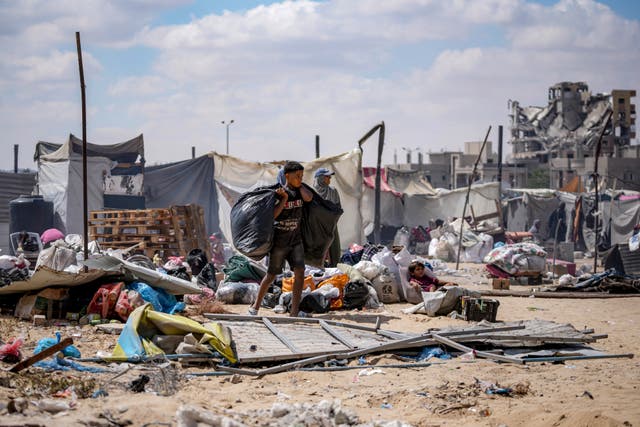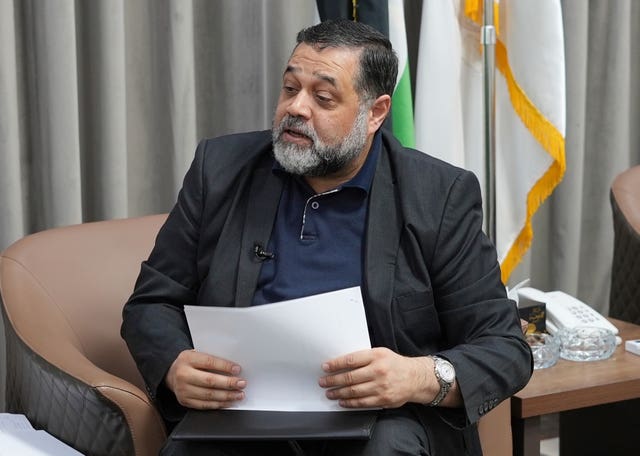Hamas official says group is losing faith in US over Gaza ceasefire talks
There are now fears that the conflict could ignite a wider conflagration.

A top Hamas official said the Palestinian militant group is losing faith in the United States’ ability to mediate a ceasefire in Gaza ahead of a new round of talks scheduled for this week.
Osama Hamdan told The Associated Press in an interview that Hamas will only participate if the talks focus on implementing a proposal detailed by US President Joe Biden in May and endorsed internationally.
The US referred to it as an Israeli proposal and Hamas agreed to it in principle, but Israel said that Mr Biden’s speech was not entirely consistent with the proposal itself.
Both sides later proposed changes, leading each to accuse the other of obstructing a deal.
Hamas is especially resistant to Israel’s demand that it maintain a lasting military presence in two strategic areas of Gaza after any ceasefire, conditions that were only made public in recent weeks.

“We have informed the mediators that … any meeting should be based on talking about implementation mechanisms and setting deadlines rather than negotiating something new,” said Mr Hamdan, who is a member of Hamas’ Political Bureau, which includes the group’s top political leaders and sets its policies.
“Otherwise, Hamas finds no reason to participate.”
It was not clear if Hamas would attend the talks beginning on Thursday.
Mr Hamdan spoke amid a new push for an end to the war, sparked by the October 7 attack on Israel in which Hamas-led militants killed 1,200 people and dragged about 250 hostages into Gaza.
Israel responded with a devastating bombardment and ground invasion that has killed nearly 40,000 Palestinians and decimated wide swaths of the territory.
There are now fears that the conflict could ignite a wider conflagration.
In the interview, Mr Hamdan accused Israel of not engaging in good faith and said the group does not believe the US can or will apply pressure on Israel to seal a deal.
Mr Hamdan claimed Israel has “either sent a non-voting delegation (to the negotiations) or changed delegations from one round to another, so we would start again, or it has imposed new conditions”.
Israeli officials had no immediate comment on the claim, but Israel has denied sabotaging talks and accuses Hamas of doing so.
During the interview, Mr Hamdan provided copies of several iterations of the ceasefire proposal and the group’s written responses. A regional official familiar with the talks verified the documents were genuine.
The documents show that at several points Hamas attempted to add additional guarantors — including Russia, Turkey and the United Nations — but Israel’s responses always included only the existing mediators, the US, Egypt and Qatar.

In a statement on Tuesday, the Israeli prime minister’s office said some changes it has asked for were merely “clarifications” that added details, such as to clauses that dealt with how Palestinians will return to northern Gaza, how many hostages will be released during specific phases and whether Israel can veto which Palestinian prisoners will be released in exchange for Israeli hostages.
It accused Hamas of asking for 29 changes to the proposal.
“The fact is that it is Hamas which is preventing the release of our hostages, and which continues to oppose the outline,” Israeli prime minister Benjamin Netanyahu said earlier this month.
Mr Hamdan, however, claimed that more than once Hamas accepted in whole or in large part a proposal put to them by the mediators only to have Israel reject it out of hand, ignore it, or launch major new military operations in the days that followed.
On one occasion, one day after Hamas accepted a ceasefire proposal, Israel launched a new operation in Rafah in southern Gaza. Israel said the proposal remained far from its demands.
Mr Hamdan said that CIA director William Burns told Hamas via mediators at the time that Israel would agree to the deal.
But, he said: “The Americans were unable to convince the Israelis. I think they did not pressure the Israelis.”
US State Department spokesperson Vedant Patel told reporters on Tuesday that Washington is making great efforts to prevent an escalation of violence and end suffering in the region.
“We are working around the clock every day,” he said. “Everyone in the region should understand that further attacks only perpetuate conflict and instability and insecurity for everyone.”
Negotiations have taken on new urgency as the war has threatened to ignite a regional conflict.
Iran and the Lebanese militant group Hezbollah are mulling retaliatory strikes against Israel after the killings of Hamas’ political leader, Ismail Haniyeh, in Tehran and of top Hezbollah commander Fouad Shukur in Beirut.
Israel claimed the latter strike, but has neither confirmed nor denied its role in the blast that killed Mr Haniyeh.
After a brief truce in November that saw the release of more than 100 Israeli hostages, multiple rounds of ceasefire talks have fallen apart.
Around 110 people taken captive remain in Gaza, about a third of them believed to be dead.





